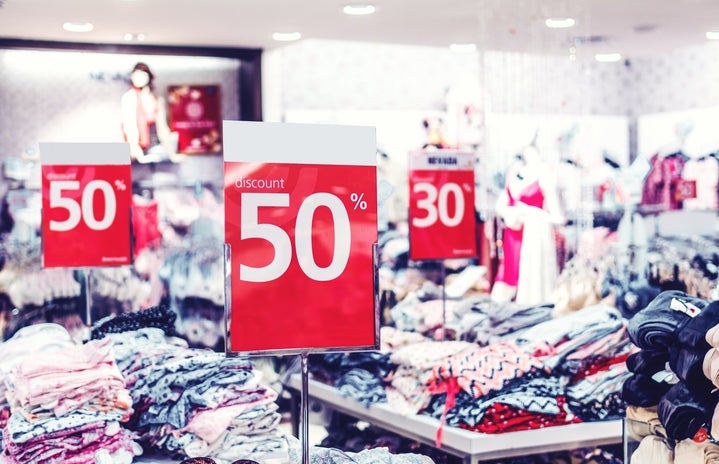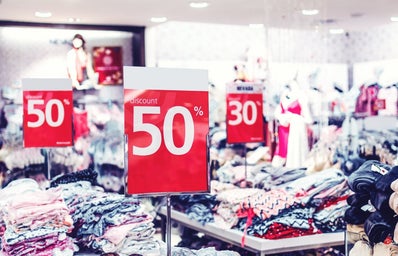We’re all familiar with Black Friday. It’s one of the only times we’re justified in our splurging, whether it be for home appliances, clothing, games, etc. There’s a wide variety of products to choose from in every store, making it something to look forward to regardless of your age or shopping needs. I never really thought of the impact Black Friday had on our planet, but what I found was interesting.
Stores everywhere have been opening earlier and earlier, some even starting their Black Friday deals on Thanksgiving night. After stuffing yourself with delicious turkey and casseroles, it’s time to head on over to your favorite store and camp out until the doors open. Then, as I’m sure we’re all familiar with, the chaos begins. People everywhere in a hurry to find what they want, grabbing everything that looks appealing on the way.
The name Black Friday is supposed to be symbolic of stores turning profit at the start of the holiday shopping season. Approximately 164 million people shop between Thanksgiving and Cyber Monday, whether it be online or in-person shopping. Some of the most consistently sought out Black Friday deals lie in technology; smartphones, TV’s, monitor screens, and laptops are some of the most popular deals. However, the truth behind these products is that a lot of people will only use them for about one or two years before discarding them. This leads to the increase of electronic waste, which contains toxic chemicals and components like lead, mercury, and biphenol-A which can all seep into the soil if disposed of improperly.
Another big sale category: toys and clothing. Most mainstream toys are made from unrecyclable plastic, not to mention also packaged in it. These worsen our pollution problem world wide. Meanwhile, cheap clothing attracts shoppers of all kinds. People wanting to refresh their wardrobe and throw out the old trends add to textile waste, which is reported to be an average of 70 pounds of clothing thrown out every year by a single United States resident. Yep, one person throws away that much clothes/textiles a year.
Online shopping has grown in popularity over the years, especially during the pandemic. So I wanted to take a look into how sites like Amazon impacted the environment. You know how when you buy something using your Prime account and you end up getting this giant box for one tiny product? Turns out there’s a reason for that. When you use expedited shipping, your product is put into whatever box is available. A good fit isn’t the priority. Getting it to you on time is the priority. Which makes sense. But unnecessarily bigger boxes leads to more delivery trucks required to get everyone’s products to them on time. It also leads to more package waste, which researchers say is adding more congestion to cities, pollutants to the air, and cardboard to the landfills. Free, fast shipping is something that is commonly offered by stores to draw you into buying more stuff from them. A pretty good business tactic if you ask me. The convenience is something we all love, but it’s a shame that it comes at such a big environmental price. On a small scale, it might not seem like a big deal. But Amazon alone has over 100 million people who have a Prime subscription. So, this isn’t very small-scale. Every day that goes by makes a huge difference in our environment.
There have been some suggestions as to how we can go about minimizing the environmental impact of online shopping (and events like Black Friday). Some stores have made it a point to stand against the harms of consumerism, especially for days like Black Friday. Patagonia consistently makes donations to nonprofit environmental groups; in 2016 they donated 100% of Black Friday proceeds to these groups. There are plenty of stores that will use your money for a good cause and try to make up for the harm shopping does to the environment. It’s hard to slow the consumerist culture we have in America, but it’s good to be educated on the matter and to look into what stores are doing about it. Stores that constantly offer faster deliver will almost certainly be wasting more packaging than they should, and using more trucks to deliver, whose carbon dioxide emissions can increase between 20% and 75% with these faster delivery promises.
I was definitely surprised to know this dark truth behind Black Friday because I had never really thought about what it was doing to our planet. I just always thought that it was helping the economy. It’s always good to learn new things and to be aware of what’s going on behind the scenes of seemingly everyday things or regular yearly traditions. I hope that I helped you learn a little bit more about this huge annual sale and that it encourages you to shop responsibly for the sake of our planet’s health!


